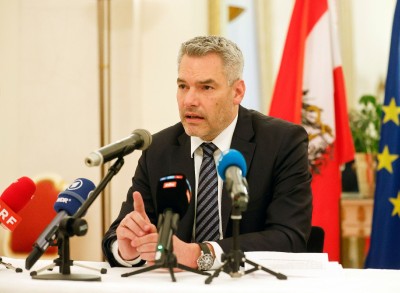Nehammer's Résumé After Kremlin Visit: "Even the Smallest Success Counts When it Comes to Peace"
Karl Nehammer's controversial visit to Russian President Putin is over. Now the Austrian chancellor commented on the open conversation and explained his motives for the visit. Although the meeting will not have any direct consequences, Nehammer is nevertheless satisfied with his move and takes positive stock of the situation.
 Karl Nehammer's conversation with Putin had attracted a lot of attention in recent days. / Picture: © Bundeskanzleramt (BKA) / Dragan Tatic
Karl Nehammer's conversation with Putin had attracted a lot of attention in recent days. / Picture: © Bundeskanzleramt (BKA) / Dragan Tatic
Austria's Chancellor Karl Nehammer has hit the international headlines several times in recent days for being the first EU head of government to visit Russian President Vladimir Putin.
After both great criticism and praise, he now recently commented on his stay and conversation with arguably the world's most controversial leader.
"It was important for me to talk to Putin himself about what is actually needed now: namely, in particular, the humanitarian corridors, the help for the people on the ground, especially from the point of view that a major offensive will be coming soon in eastern Ukraine. It was not a friendly visit, it was a clear, direct discussion, in all frankness also describing the problems and the madness of the war," said Chancellor Karl Nehammer after the meeting in Moscow.
Nehammer noted that he went to the Russian capital without any expectations. It was not reasonable to assume that President Putin would be willing to make any concessions.
This was also very unlikely in the current war situation. The goal, however, had been to confront Putin with the crimes and suffering he had seen in Ukraine and to leave no stone unturned to bring about a cessation of hostilities or at least humanitarian progress for the suffering civilian population in Ukraine.
Speaking to Chancellor Nehammer, Putin accused the international community of not accurately reporting the events of the war and spreading fake news. Putin pointed out that the Russian Federation was cooperating with the international Red Cross and that the creation of escape corridors was only failing on the Ukrainian side. Whether these statements are true is highly doubtful.
Putin also does not intend to know anything about the well-documented war crimes, for example in Butscha. He said that the Russian Federation distrusts the international assessment of war crimes and considers it one-sided.
"I have contradicted this and said that Austria will make a contribution - if necessary and desired - in order to establish precisely this objectivity in the clarification of war crimes. It is the need of the hour that those responsible are identified and also held accountable for this," the chancellor said.
Asked about a possible cease-fire or peace agreement, the president reacted in a wait-and-see manner, according to Nehammer's impression.
According to Nehammer, the Istanbul negotiations would be "an important format for actually being able to achieve progress for peace here. Vladimir Putin has brought them into play several times. He's interested, despite all the logic of war, and I think that's a sign of hope that these negotiations will continue and then also lead to results."
He said it was important that, alongside all the "madness of violence," there was a space where talks could take place despite everything. He said he would also speak with Turkish President Recep Tayyip Erdogan in the coming days, as he was playing a leading role in the negotiations.
Summing up, the chancellor noted that he had "generally not gained positive impressions" from his meeting with Russian President Vladimir Putin, but there was a need for face-to-face confrontation.
"I think it is important to do something than to do nothing. And that's why it was important for me to confront President Putin with the facts of the war, with the suffering of the people in Ukraine. If you ask me about whether that has an immediate impact, then: No. It was important to address that and to re-energize the Istanbul peace talks, so to speak, so that they continue. Then every effort is worth the effort. Even the smallest success counts when it comes to peace," Nehammer concluded.



